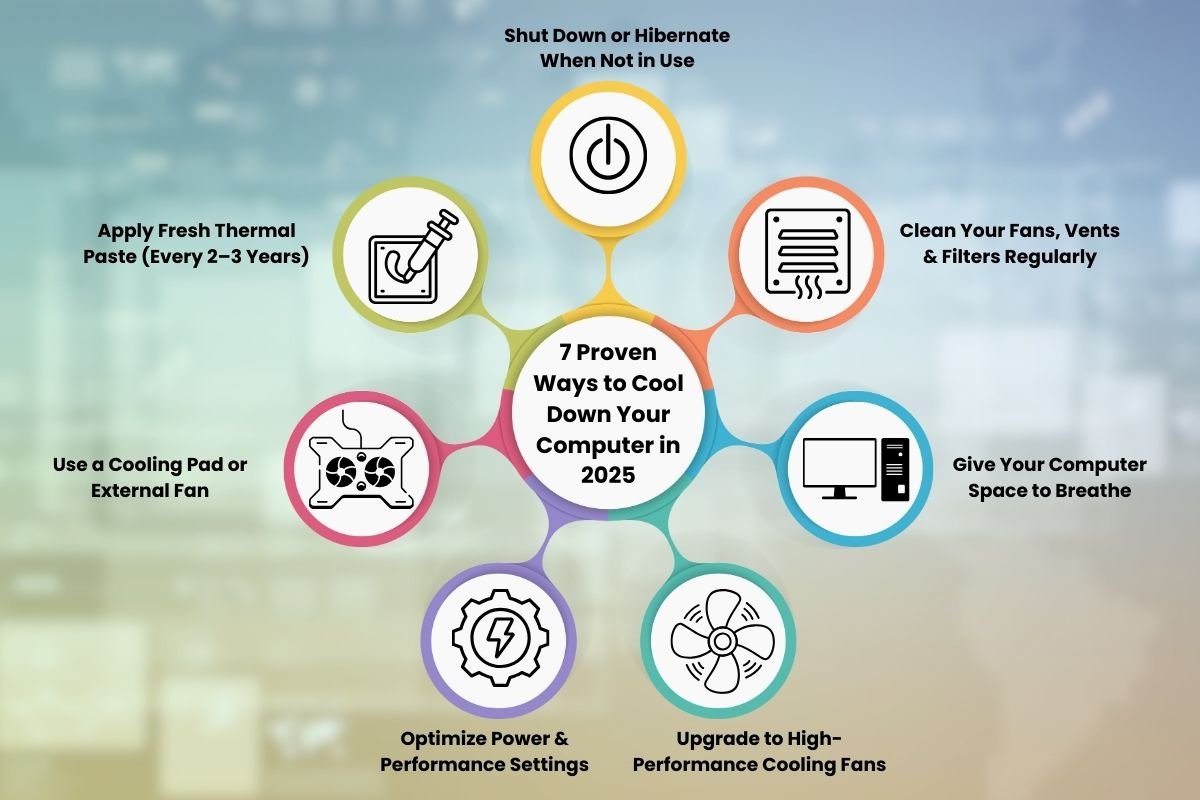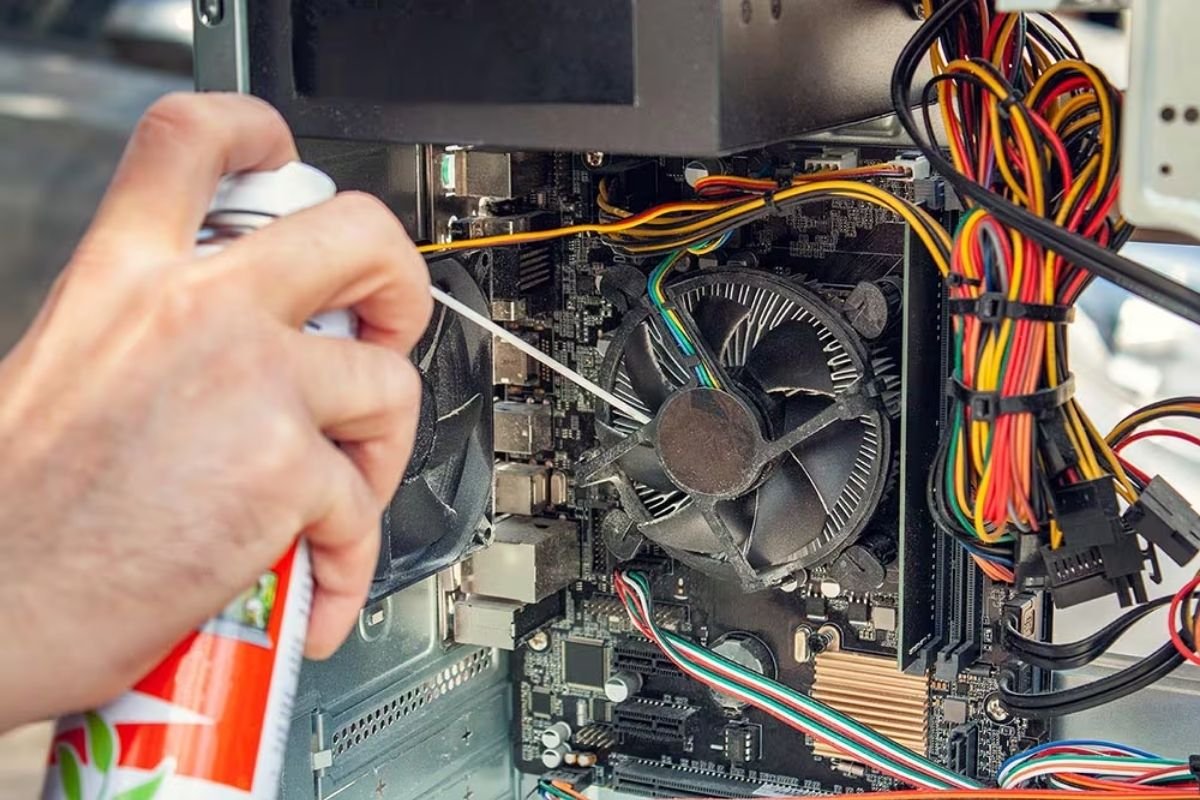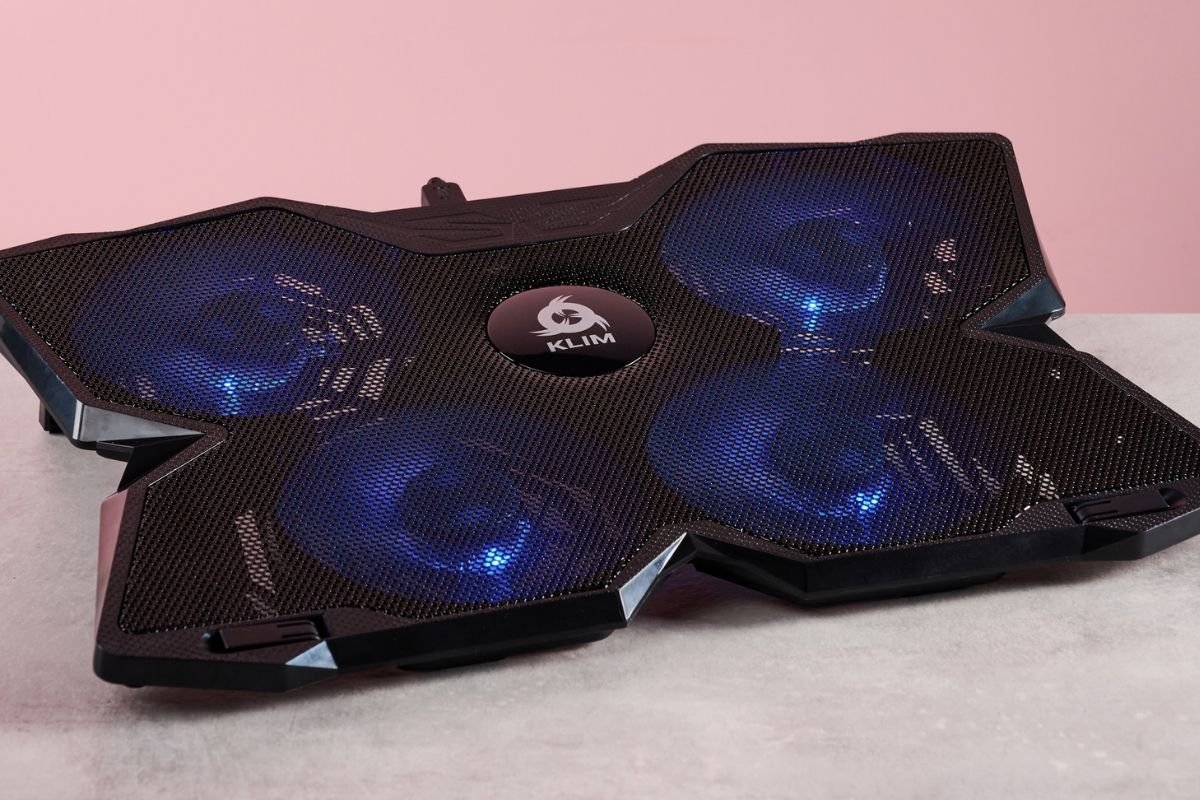Have you ever had your computer sound like it was auditioning for summer? You hear the fans whirring, the apps are lagging, and before you know it, you are wondering if your laptop can double as a toaster. Overheating is not just an annoyance. It is a silent killer for your device.
In 2025, you can expect to see heavier software, AI-powered apps, and longer gaming sessions, and keeping your computer cool is going to be more important than ever before. Overheating is able to crash your system, while also hurting your important components like the CPU, GPU, and motherboard, even killing them essentially.
The good news is this: cooling your PC or laptop is not expensive or complicated. In this article, we have listed 7 updated, tried and true, and beginner-friendly ways to cool down your computer in 2025. This will keep it running smoothly.
7 Proven Ways to Cool Down Your Computer in 2025
Keeping your computer cool is more important than ever. Unfortunately, heat affects performance, component longevity, and can even impact system stability. Here are seven simple, current, and effective ways to cool down your computer and protect your rig from overheating:

1. Clean Your Fans, Vents & Filters Regularly
Dust is still your computer’s biggest enemy. It clogs vents, slows airflow, and forces fans to work overtime, creating even more heat.
➤ 2025 Tip: Most modern PCs and laptops now have removable dust filters. Clean them every 2–3 months using compressed air or a handheld electric air blower. Keep your computer at least 6 inches off the floor to minimize dust intake.

2. Give Your Computer Space to Breathe
Your computer needs open airflow, just like you need oxygen. Don’t push it against a wall or trap it inside a closed cabinet.
➤ Pro Tip for 2025: Many gamers now use vertical laptop stands or wall-mounted PC cases to optimize airflow. Ensure there’s at least 2–3 inches of clearance around vents to cool down your computer effectively.
3. Upgrade to High-Performance Cooling Fans
A stock fan might be fine for light use, but modern applications generate more heat than ever.
➤ 2025 Upgrade: Invest in PWM (Pulse Width Modulation) fans or ARGB case fans—these automatically adjust speed based on temperature, ensuring efficient cooling without unnecessary noise.
4. Optimize Power & Performance Settings
Sometimes your system overheats simply because it’s running harder than it needs to.
➤ 2025 Settings to Try:
- Enable “Balanced Mode” in Windows or macOS when not gaming.
- Lower in-game resolution or turn on DLSS/FSR for smoother performance with less strain.
- Close unused browser tabs and background apps; modern AI tools can consume massive processing power.
5. Use a Cooling Pad or External Fan

Especially useful for laptops, cooling pads improve airflow underneath your device.
➤ 2025 Tech Upgrade: Look for USB-powered RGB cooling pads with adjustable fan speeds and built-in temperature displays. For desktops, small clip-on desk fans can blow fresh air directly into intake vents to cool down your computer quickly.
6. Apply Fresh Thermal Paste (Every 2–3 Years)
Thermal paste transfers heat from your CPU/GPU to the cooler. Over time, it dries out, reducing efficiency.
➤ 2025 Best Practice: Use premium liquid metal thermal paste for high-end builds (only if you’re comfortable with careful application). For regular PCs, top-tier non-conductive pastes like Arctic MX-6 work great.
7. Shut Down or Hibernate When Not in Use

Leaving your computer running constantly generates unnecessary heat.
➤ 2025 Energy Tip: Use automated power schedules. Windows, macOS, and Linux now allow you to set sleep/hibernation timers. If you’re stepping away for more than 2 hours, shut it down completely.
Conclusion
In 2025, keeping your computer cool isn’t just about comfort. It’s about protecting your investment. With advanced processors, AI workloads, and graphic-heavy tasks pushing systems harder than ever, a smart cooling routine is essential.
By following these 7 updated methods, cleaning regularly, giving your system breathing room, upgrading fans, optimizing settings, using cooling pads, refreshing thermal paste, and shutting down when idle. You’ll not only prevent overheating but also enjoy faster performance and fewer crashes.
Remember: a cool computer is a happy computer. Make it a habit to cool down your computer, and it will serve you efficiently for years beyond its warranty.
FAQ:
1. What causes a computer to heat up?
The most common reason for an overheating computer is dust buildup on the fans or air vents. Reduce the heat inside the computer to improve the system’s performance and prevent any damage to the internal components.
2. How do I tell if my PC is overheating?
A PC overheating can manifest in several ways. Physically, you might notice excessive heat radiating from the machine, especially around the vents or the bottom of a laptop. Internally, loud fan noises, often indicating the fans are running at maximum speed, are a common sign. Performance issues like sluggishness, freezing, crashing, or even unexpected shutdowns are also indicators.
3. Can heat damage your computer?
Heat can damage hard drives and solid-state disk drives, leaving you without access to your data. With proper cooling, it may be possible to revive the disks/drives, but if the heat and damage persist, the data may be unrecoverable.


















